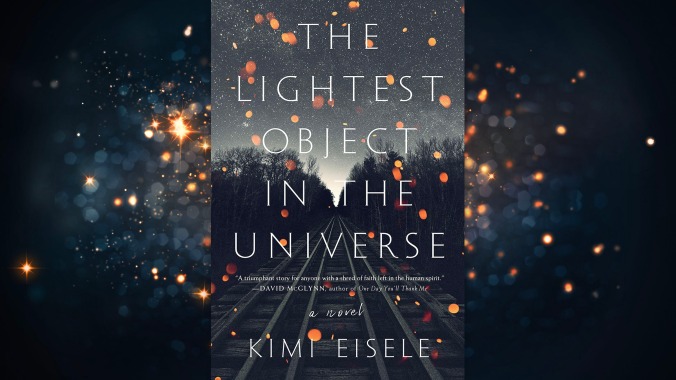If we’re honest, the collapse of civilization is probably only a few decades away. Science fiction writers came to this realization at least half a century ago, which is why our grandparents got the hopeful, technicolor Star Trek, while we get the nihilistic, drab Walking Dead. Pretty much everyone agrees the end of the world will be a bad thing for humanity, but a few recent novels—like Ling Ma’s Severance and David Williams’s When The English Fall—have challenged that assumption. Sure, the apocalypse will be horrific for a while, but could a planet-wide reset button be a good thing in the long run?
Kimi Eisele’s debut novel, The Lightest Object In The Universe, might be the most optimistic post-apocalyptic story ever written. It’s Sleepless In Seattle meets Station Eleven. Our Tom Hanks is a widower named Carson Waller, a high school history teacher on the East Coast. He’s in love with Beatrix Banks, a fair-trade activist on the West Coast. They’ve only spent about 30 hours together when the apocalypse hits—an economic disaster called the October Shocks, followed by a flu pandemic, extreme weather from climate change, and finally, complete power-grid failure across the United States.
“If for some reason everything implodes and the shit really hits the fan and we can no longer send words or speak to each other, I’ll come find you,” Carson writes in his last email to Beatrix before the power goes out. Armed with a flashlight, iodine tablets, and a map, Carson embarks on a cross-country journey on foot. He follows old rail lines west through Pennsylvania, Ohio, and Illinois. He avoids Chicago completely (“Lead in the water supply had upended the city even before the grid went, and now there was nothing but mayhem”). He sleeps in abandoned train stations. Almost everyone he encounters is friendly and eager to share food.
Meanwhile, Beatrix stays put on the West Coast, banding together with neighbors to form an intentional community—reopening schools, tending gardens, and… launching a public radio station. Her story is less compelling than Carson’s quest narrative, but Beatrix is assertive, and she gets most of the book’s best lines. “The speed of this collapse astounds me,” she writes to Carson before “the darkness” wipes out the internet. “I guess I, too, believed in some kind of American exceptionalism, though I resented it enough to think I could destroy it. Now look. Maybe we did.”
Some people will find The Lightest Object In The Universe impossibly naïve. Instead of a post-apocalyptic wasteland, Eisele gives us bicycle networks and community gardens. Chapter after chapter, just when you expect things to take a dark turn, red flags become red herrings. Surely this many people would never be so kind to strangers, especially in a future where everyone is unshowered and starving. But everyone is also grieving, and that’s where Eisele might have a point. When we only imagine violence in a post-apocalyptic future, are we underestimating the transformative power of grief?
The novel’s villain—a charismatic preacher named Jonathan Blue—haunts the first half of the novel with creepy radio broadcasts. He claims to have predicted the end of the world and welcomes survivors to join his people at “the Center,” a community somewhere in Wyoming that still has running water and electrical power. “You can leave the filth of your cities and neighborhoods and come here, where we are creating a new technology,” he extolls over the airwaves.
On his westward journey, Carson finds the Center and comes face-to-face with Blue. “You know, the darkness was a good thing for us,” Blue says. “We had become pixelated. Our selves had fragmented across the globe, across an illusory web, the internet.” But a few pages later, during a tour of the Center’s agricultural fields, a woman takes Carson by the arm. “Listen to me… There is more to it,” she whispers, and our deep mistrust of post-apocalyptic religious communities finally pays off.
That kind of tension is missing from too much of The Lightest Object In The Universe, which is perhaps 75 pages too long and 20 percent too preachy about capitalist greed. But the leisurely chapters are full of beauty, the characters are layered and nuanced, and the plot still moves at a faster clip than Charles Frazier’s Cold Mountain, another Odyssean novel about lovers separated by harsh geography. To be fair, there are plenty of horrors in Eisele’s version of the apocalypse. A lot of people die. But unlike The Road, The Lightest Object is mostly interested in the survivors who are kind to one another. If that sounds naïve, maybe Cormac McCarthy made us all too cynical.


 Keep scrolling for more great stories from The A.V. Club.
Keep scrolling for more great stories from The A.V. Club.